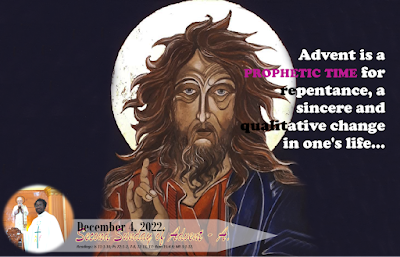GIVING TO THE LORD.
November 7, 2021
Thirty-second Sunday in Ordinary Time – B.
“For they have all contributed from their surplus wealth, but
she, from her poverty, has contributed all she had, her whole livelihood.” (Mk
12:44)
A Spanish proverb says: “Say nothing when you are giving --
only say something when you are receiving.” And a Corsican proverb adds:
“Giving what one does not possess is always a sign of charity.”
It is said that God loves a cheerful giver. To give to the
Lord, one must have no half measure. Either you fully give all with all your
heart or you give nothing.
Speaking of love as the greatest of all commandments, the
Lord insisted on this dimension of totality: "You shall love the Lord your
God with all your heart, with all your mind, with all your strength, and with
all your soul..." (Mk 12:30), a replication of Deuteronomy 6:5. For,
genuine love knows no measure and has no half measure. You love and you give
all that you are and all that you have out of love, or you do not love at all
and so, you give nothing.
Another word to speak of this love which means totality and
sacrifice is charity. And the first and greatest charity is that of Christ.
“The charity of Christ is the source in us of all our merits before God. Grace,
by uniting us to Christ in active love, ensures the supernatural quality of our
acts and consequently their merit before God and before men. The saints have
always had a lively awareness that their merits were pure grace. ‘After earth's
exile, I hope to go and enjoy you in the fatherland, but I do not want to lay
up merits for heaven. I want to work for your love alone... In the evening of
this life, I shall appear before you with empty hands, for I do not ask you,
Lord, to count my works. All our justice is blemished in your eyes. I wish,
then, to be clothed in your own justice and to receive from your love the
eternal possession of yourself’...” CCC. 2011.
God does never forsake those who love him and give him all
out of love. In today's readings, we are given some beautiful examples to prove
this affirmation. In the first reading, fleeing from the fury of Queen Jezebel,
after the drought he proclaimed on the land, Elijah arrived in Zarephath and
met a widow gathering wood to prepare something for herself and her orphan
child. The episode of Elijah and the widow of Zarephath teaches a lot about
God's providential care for those who give him even the very little they have,
and mostly set their firm trust in him. Upon the request of the Prophet, the
poor woman presented their situation, her son and her. They had, left to them
as food, "only a handful of flour in a jar and a little oil in a
jug." Just enough for the daily bread and wait for death. For, there was a
famine. But she trusted the Lord and the Word of the Prophet: "the jar of flour
shall not go empty, nor the jug of oil run dry, until the day when the Lord
sends rain upon the earth."
The Lord makes the same promise to us every day, inviting us
to trust in him and give him cheerfully our love and heart, to firmly set our
hope in him alone.
Many people, today, trust more in material security. They
want to assure their tomorrow by accumulating wealth and possessions. In all
truth, all that we accumulate today will be of no use for our salvation
tomorrow. It is only what we give out of love that counts. “Charity and only
charity will save…” says the Saint. The second reading, speaking of the
sacrifice of Christ the great High Priest, says that the only sacrifice that
pleases God is a heart ready to love, a heart that shares everything, until its
very life. Like Christ, when you give out of love, there is no repetition or
reiteration of your sacrifice.
In the Gospel, the Lord Jesus praises the offering of a poor
widow. It is a stern warning on haughtiness and cheating, and a call on
humility and genuine love. While rich people gave heartlessly their surplus,
even though in huge amounts, the widow, from her poverty, gave all she had, her
whole livelihood. And that is what the Lord Jesus noticed, not the quantity,
but the quality of the donation. The ones who give much are amounting to
little, while the one who gives little is amounting to much. God cannot be
insensitive to such an offering. What is given from the heart reaches the heart
of God and brings back blessings on the giver. but what is given only from the
pocket impacts not on the giver and does neither move the receiver, who is God.
The Son of God, at the Cross, did not give only half of
himself and his love. He gave all, until the last drop of blood and water. Love
either is total or it is not love. For, we said, there is no half measure in
love. We are challenged today to reevaluate our relationship with God and with
our neighbors. Do we truly do everything with love and out of love, or do we
only seek personal and egoistic interests in our actions and religiosity?
We live in a world where the show, the exhibition, the worship of the self, count more than anything. We are all like politicians who, when they give one cent, blow a horn to make it known by all. Lord tells us that love resides not in the ostentation. Noise does no good, and the good does not make noise. To give to the Lord, we must give out of love.





Comments
Post a Comment